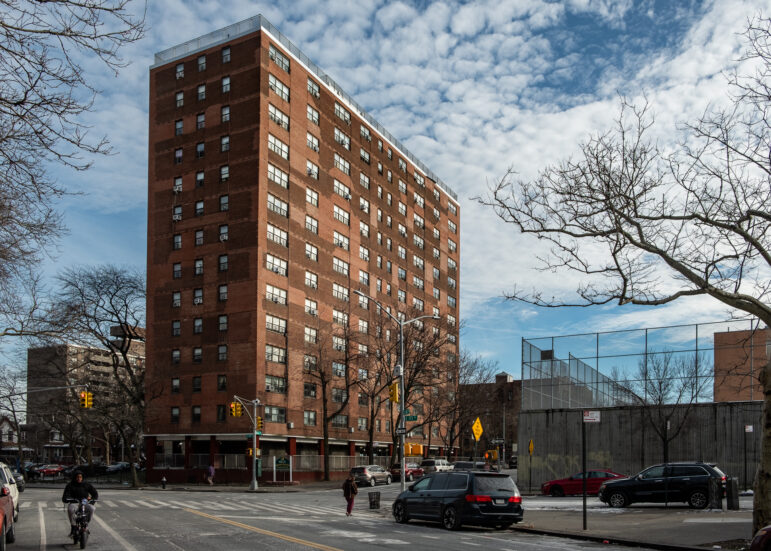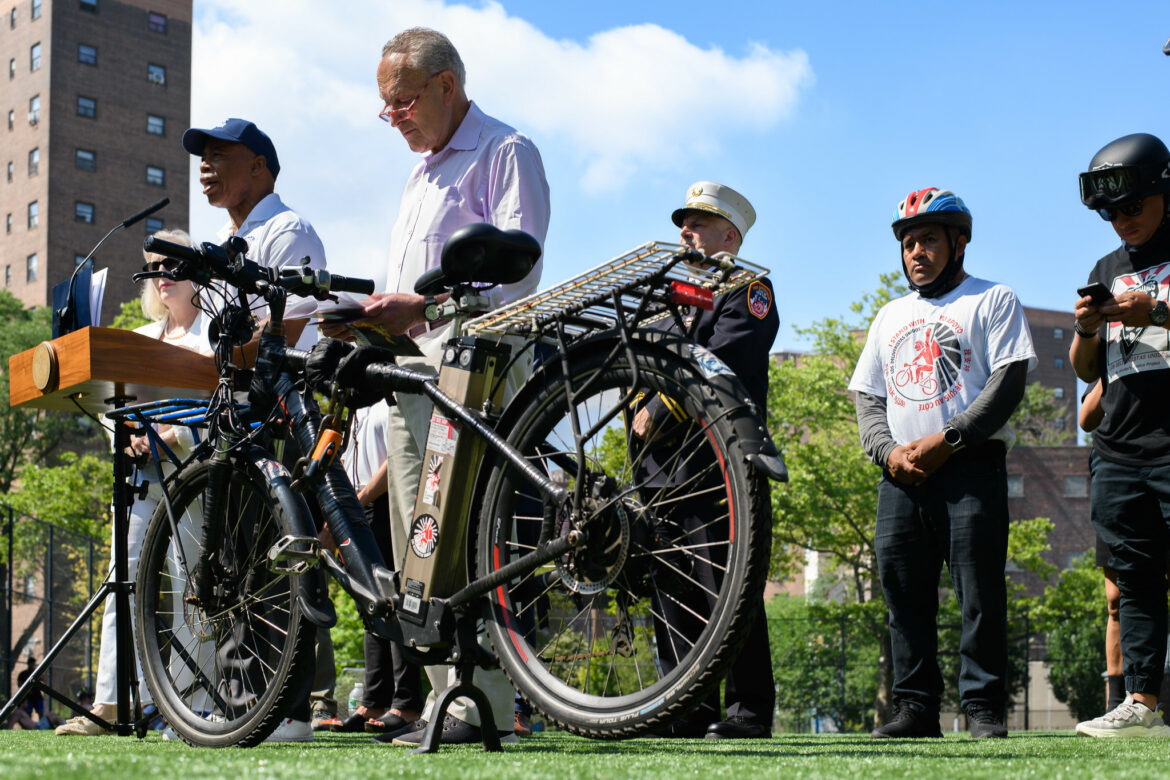Nearly four months in, NYCHA broke down its lithium-ion battery rules and the potential consequences for noncompliance.

Adi Talwar
NYCHA’s Bronx River Addition. An e-bike battery sparked a fatal fire at the neighboring Bronx River Houses last year.The New York City Housing Authority’s policies to prevent lithium-ion battery fires—and consequences for rule violators—came into sharper focus at a City Council hearing Monday.
Acknowledging that its residents may need electric bikes and scooters for activities ranging from grocery shopping to app-based delivery work, NYCHA introduced an “Electric Micromobility Policy”—a list of can and can’t do’s—in March.
The last three years have seen a spike in lithium-ion battery fires, which are difficult to extinguish and can be deadly.
Rules include not charging more than one device or its battery in an apartment simultaneously, having an adult “present and awake” while charging is in process, and not having an e-bike, e-scooter or its battery within five feet of a heating source, or blocking an entryway such as an apartment door.
Electric devices permitted in New York City are allowed. For example, an e-scooter that weighs under 100 pounds and travels no faster than 15 miles per hour, according to a chart by the city’s Department of Transportation. But electric mopeds, dirt bikes, segways and hoverboards are prohibited.
Tenants who violate the policy could face lease termination, but the housing authority emphasized Monday that this option is a worst case scenario.
NYCHA’s Chief Operating Officer Eva Trimble testified that residents will be entitled to three chances before more serious consequences kick in.
“The property management will call the resident in for a conference to discuss the situation with them and hopefully explain the safety hazards,” she said. “Make sure they understand the violations of the lease that could exist and hopefully explain the safety hazards that could exist and bring about compliance.”
After three conferences, the next step could be administrative termination—a hearing conducted by NYCHA to determine whether a tenant should be evicted or put on probation. Tenants on probation have a set period of time to correct any issues, and may face eviction if they fail to comply.
“If we are successful with the administrative termination process, then we can further proceed through a legal action through housing court,” Trimble said. “However, our goal is to keep people housed and to keep our residents safe in the process so we hope that it would never come to that.”
Lithium batteries were a leading cause of fires and fatalities across the five boroughs last year, the New York City Fire Department reported in February. In 2023, there were 268 fires caused by lithium-ion batteries resulting in 150 injuries and 18 deaths—including one man who died at the Bronx River Houses in Soundview in December.
But a 2022 NYCHA proposal to ban battery storage and charging in public housing altogether was subsequently scrapped, as THE CITY has reported.
NYCHA maintenance workers, Trimble explained Monday, are tasked with examining apartments annually. If they come across any apparent violations of the new lithium-ion battery rules, they are instructed to report the resident to management. NYCHA has also set up an anonymous tip line for potential battery issues, which residents can call at 718-707-7771.
Speaking at the hearing Monday, Dana Elden, a tenant association president at the St. Mary’s Park Houses in the Bronx, said wheelchair users like herself also rely on lithium-ion batteries, and need adequate electricity in their apartments to charge up.
“There is a growing population of those like myself who are disabled and use electric wheelchairs that use lithium batteries,” she said. “My chair uses two lithium batteries that must be recharged almost daily in my apartment.”
In an email exchange after the hearing, a NYCHA spokesperson said most apartments should be able to meet the electrical demand to charge an electric wheelchair. But they urged anyone who needs assistance to either submit a work ticket or dial the Customer Contact Center.
“While NYCHA’s policy for the safe charging of e-micromobility devices does not pertain to electric wheelchairs, the authority encourages best practices when it comes to charging these and all devices,” a spokesperson for NYCHA said. “Electric wheelchairs should not be charged near doors or using extension cords.”
Brian Honan, the senior vice president of intergovernmental affairs for NYCHA,
explained Monday how the policy will affect Permanent Affordability Commitment Together (PACT) sites. These developments are part of an initiative that converts traditional Section 9 public housing to more lucrative Section 8 financing, and instates private management companies.
For developments that are either in the process of transitioning or will become PACT sites in the future, the NYCHA policy will be honored, according to Honan. Any development that converted prior to March 1 will have its own policy.
“They’ve all been informed of our policy and are encouraged to come up with something similar,” Honan said.
NYCHA is not requiring its residents to register their e-bikes. Therefore, the authority does not know how many electric micromobility devices there are across its campuses, or who has one.
“I highly recommend that you look into ensuring that these e-bikes are registered through NYCHA,” said Bronx Councilmember Rafael Salamanca. While some residents may rely on these devices for delivery jobs, he added, “I want to ensure, like we all do, safety for our tenants and constituents first.”
In March 2023, NYCHA launched a pilot program with Con Edison, tapping four developments for new designated battery charging and storage areas—Queensbridge North and South in Long Island City, De Hostos on the Upper West Side, and Van Dyke 1 in Brownsville.
Installation is expected to begin in 2025, according to Trimble.

Benny Polatseck/Mayoral Photography Office
New York City Mayor Eric Adams with U.S. Senator Charles Schumer and U.S. Senator Kirsten Gillibrand at NYCHA Baruch Houses last year, announcing funds for new e-bike charging stations at NYCHA.Also last year, NYCHA got a $25 million grant from the U.S. Department of Transportation for charging and storage stations to be placed at 53 other campuses across the city.
“The award of the grant, however, has not yet been finalized,” Trimble said. “So, we are working closely with our fellow state partners on finalizing the grant award and developing plans for the implementation of that.”
NYCHA hosted a fire safety symposium last October geared toward tenant association leaders, and has more planned.
“Moving forward we have six of these fire safety symposiums planned this year, the first one is in the Bronx on July 15,” NYCHA Fire Safety Director Joe Terranova testified.
“The best fire to have is the one that doesn’t get started in the first place,” he added.
To reach the reporter behind this story, contact Tatyana@citylimits.org. To reach the editor, contact Emma@citylimits.org
Want to republish this story? Find City Limits’ reprint policy here.








